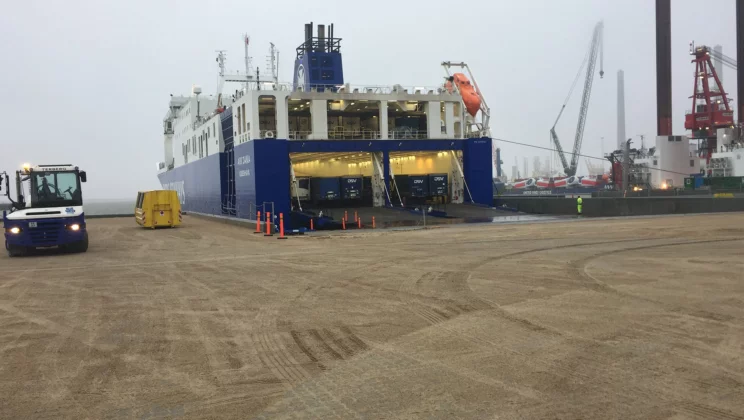European businesses are currently holding their breath as the date of the United Kingdom leaving the EU is approaching. The dramatic 'No deal' scenario, which no one thought possible just two years ago, is now a real possibility, and businesses and ports are in full swing with the preparations.
When the British in 2016 voted 'no' to remain a member of the EU, few people expected that two years later, we would be left with no prospect of an agreement on the future of trade between the European Union and the United Kingdom. No deal, however, can very well become reality and currently several European countries are increasing their work force in order to handle the new customs requirements. Most recently, the Netherlands announced about 900 new hires and Denmark around 50 to handle the new challenges that will arise if the rules remain unclear at the time of Brexit.
In late August, the Danish Chamber of Commerce sent a letter to its members, in which they urge them to prepare for a scenario with no agreement. But for a number of companies, it's old news. For they have been preparing for that scenario for a long time.
At DSV at the Port of Esbjerg, Morten Kjærgaard, Vice President of Frigo and Domestic Contract and Esben Knudsen, Divisional General Manager, say they have been looking into how to deal with no deal for a long time.
"All we can do is prepare ourselves for the worst, but hope for the best," says Morten Kjærgaard.
The message is the same from Kasper Thormod Nielsen, head of European Public Affairs at Arla, which has 25 percent of their total turnover in the United Kingdom. Nevertheless, the growing uncertainty about the outcome complicates preparations while time is running out.
And the seriousness of the situation is not only obvious in Denmark. It is reciprocated on the other side of the North Sea. Here we find Richard Ballantyne, Chief Executive of British Ports Association. He is concerned:
"Right now, the movement of tens of thousands of road vehicles on a daily basis between the EU and the UK, via our seaports, is under the spotlight because there is currently no agreement," he says.

Richard Ballantyne, Chief Executive of British Ports Association, is worried by the potential impacts of 'No Deal'.
Preparations are underway
The international transport company DSV has been preparing for Brexit since the days after the national referendum back in 2016.
"We have had to prepare ourselves for every possible outcome of this situation – that is, the hard, soft and medium variant, which will be similar to our current agreement with Norway. It has been necessary to prepare an overview of all the possible implications, so that we can take the right precautions," says Morten Kjærgaard from DSV's offices at the Port of Esbjerg.
After the referendum, the company set up a task force with representatives from all the European offices. This has allowed them to coordinate their input and create a common, balanced overview of the situation.
"Right now most people expect a hard Brexit. This is also what we hear from our British colleagues," says General Manager Esben Knudsen and elaborates:
"It's surreal, because we really are faced with having to restore routines and workflows which for the last 30 years have been unnecessary because of the internal market."
Both Morten Kjærgaard and Esben Knudsen estimate customs clearance will be the biggest challenge in practice. Therefore, they are currently hiring staff to ensure they have the right skills within their organisation in the event that customs procedures are reinstated.
"Hard Brexit or the so-called no-deal-scenario puts new demands on us. For instance, we need to be much better at making product labels. New adjustments and differentiated tariffs at the borders mean that we must make our preparatory work extremely thoroughly if transportation is to continue to operate smoothly," assesses Morten Kjærgaard.

New adjustments and differentiated tariffs at the borders mean that we must make our preparatory work extremely thoroughly if transportation is to continue to operate smoothly, assesses DSV, which has much interaction with UK ports via the Port of Esbjerg.
Seamless trade is first priority
At Arla, possible customs procedures are also a cause for concern. Like DSV, the dairy giant has prepared extensively for Brexit since 2016, anchored in a task force with representatives from across the business. As Europe's second largest dairy company and the largest in the United Kingdom they need to be abreast of every imaginable consequence of Brexit.
"As a European cooperative with farmer owners in seven different European countries and nearly 75 production sites across the EU we needed to be clear on the potential impact of Brexit on every aspect of our business." says Kasper Thormod Nielsen, head of European Public Affairs, and elaborates:
"The task force has been central to our scenario and contingency planning. Having a single team responsible for coordination meant that we were able to join the dots across our business."
He stresses that Arla respects the decision of the British people.
"But we know that that decision has consequences, most notably the potential for barriers to trade between the UK and the EU. We have long advocated for frictionless trade to be part of the future UK/EU relationship."
At DSV, Morten Kjærgaard and Esben Knudsen agree that seamless trading is the absolute first priority.
"It's quite simple. We make a living from transporting goods, and the easier it is to transport, the more goods are transported. The more trade barriers, the worse for a company like ours."
DSV's activity level in both England, Scotland and Ireland is high, and 1,000 staff are employed at the office in England.
"One of our concerns is, of course, that trade may diminish. For instance, if a product is imposed with a 25 percent customs duty, it will have consequences for both production and transport. Therefore, it may be obvious for smaller companies to go beyond the United Kingdom in the future. In that case, it makes more sense to look at Northern Germany or The Netherlands", says Morten Kjærgaard.
Apart from the anxieties of customers, DSV has not yet experienced any direct implications of Brexit. At Arla, the situation is completely different. Here the dramatic decline of the Pound in the wake of Brexit has affected Arla's business. The dairy company believes that at this stage it has already cost them a three-digit million amount.

Kasper Thormod Nielsen, head of European Public Affairs at Arla.
English ports are hubs
In the United Kingdom, Chief Executive Richard Ballantyne of the British Ports Association (BPA) also hopes for an agreement that ensures smooth trade between the United Kingdom and the European Union. No less than 95 percent of all trade in the United Kingdom goes via the country's approximately 130 cargo handling ports. Therefore, a lot is at stake with Brexit. Both for the ports and for the trade.
"Our RoRo ports have tried to assess the implications of the current situation. But as they don't know what the final agreement will be, it's impossible for them to make the necessary decisions. It could, for example, become necessary to create a whole new infrastructure at the terminals if customs clearance is reinstated," he says.
Richard Ballantyne and the BPA have been included in a number of national committees in order to clarify the possible implications for British ports:
"Of course, it’s right that the Government considers all possible outcomes, but we've reached a point where a serious plan is needed. Not least for how the physical and electronic borders should work at British ports and, with this in mind, where funding is going to come from," Richard Ballantyne says.
RoRo will be hit hard
If you ask Ballantyne, RoRo-traffic is facing the biggest challenges. The vast majority of Britain's trade with the EU is done via the UK’s 30 or so RoRo ports which include the likes of Dover, Holyhead, Immingham and Portsmouth. Here, a no-deal scenario and the subsequent border control and customs clearance processes could cause serious problems, he says.
"Of course it will be possible to develop IT solutions for customs procedures, but it may take time to develop them, and at the same time there are many parties in the value chain which must adapt to the new procedures," Richard Ballantyne says.
His concern resonates with DSV in Denmark, which is also focusing on the possible infrastructural challenges, where drivers, for example, suddenly must stop at the borders. At the end of the day, it may affect the total capacity of lorries in Europe, according to Esben Knudsen. It is problematic, because there's already a shortage of drivers.
British ports see opportunities in the darkness
Although tariffs, border controls and trade agreements are the crucial points in the context of Brexit, Richard Ballantyne estimates that Brexit could also lead to new opportunities for British ports. For example, new global trade agreements in combination with a European agreement could lead to increased activity for British ports.
"We'd like to get rid of some of the rules from Brussels – for instance, the EU's new Port Services Regulation, which does not take the governance models of the British ports into account. We'd also like to review the Birds and Habitats Directive, just as we believe that there are opportunities to strengthen British fishing," he says.
At DSV, neither Morten Kjærgard nor Esben Knudsen reject the notion that Brexit could provide new opportunities for the company.
"We are trying in fact to look positively at all of this. And we believe the new rules may give rise to other types of tasks for us in the long term. Registration of goods, customs rules, etc. will most likely create a demand for new types of consulting services among our customers," says Morten Kjærgaard and explains that the company currently is specifically looking into how to invest in the right skills to lift this kind of consulting service.
Finally, DSV believes that the traffic to England out of the Port of Esbjerg can also benefit from Brexit.
"There has been a tendency to drive goods to England via the English Channel, but now we actually expect that shipping to and from Esbjerg will increase. If the alternative is to drive by lorry to France and wait to get through customs, it might be more attractive to leave the lorry in Esbjerg and sail the trailers across the water," says Morten Kjærgaard.
FACTS: DENMARK'S TRADE WITH THE UNITED KINGDOM
NEXT TO IRELAND AND THE NETHERLANDS, DENMARK IS THE COUNTRY IN EUROPE WHOSE TRADE WILL BE HIT THE HARDEST BY BREXIT, ACCORDING TO THE IMF.
ABOUT 7 PERCENT OF DENMARK'S TOTAL EXPORTS CURRENTLY GO TO ENGLAND, ACCORDING TO THE DANISH CHAMBER OF COMMERCE.
THE UNITED KINGDOM IS DENMARK'S FIFTH LARGEST EXPORT MARKET, AND THE CENTRAL BANK OF DENMARK HAS CALCULATED THAT 54,000 DANISH JOBS ARE DIRECTLY LINKED TO THE TOTAL EXPORTS TO THE UK.
ONCE IT WAS BUTTER AND BACON THAT TOPPED THE LIST OF EXPORT ITEMS. FOODS ARE STILL IMPORTANT, BUT NOWADAYS THE LIST ALSO FEATURES CRUDE OIL AND WIND TURBINES.
FACTS ABOUT BRITISH PORTS
- 95 PER CENT OF ALL TRADE IN THE UNITED KINGDOM IS DONE VIA THE COUNTRY'S 130 COMMERCIAL PORTS.
- 101,000 PEOPLE ARE EMPLOYED AT BRITISH PORTS.
- THE PORTS HAVE A TURNOVER OF 7.6 BILLION POUNDS EACH YEAR.
- 500 MILLION TONNES OF GOODS ARE TRANSPORTED VIA THE PORTS EACH YEAR.
- 500,000 TONNES OF FISH LAND AT BRITISH PORTS EACH YEAR. THEY HAVE A VALUE OF 750 MILLION POUNDS.
SOURCE: THE BRITISH PORTS ASSOCIATION
Go to overview

